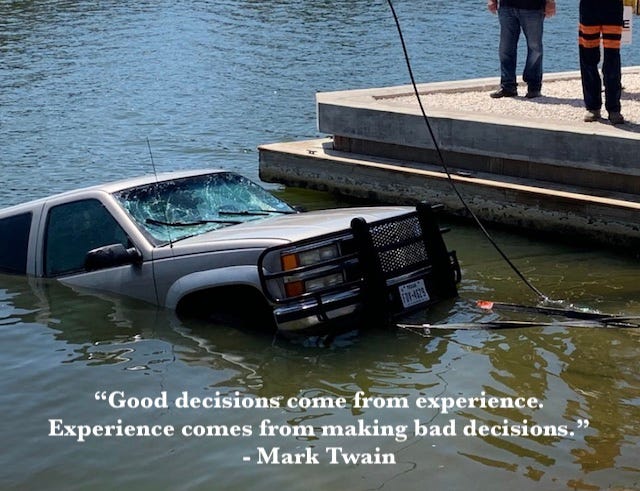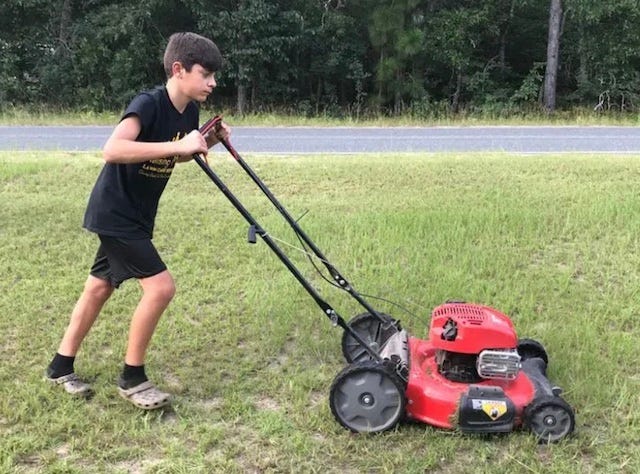Is your teen as responsible as you think they should be?
How to get your kid to take on more responsibility without losing your mind or wrecking your relationship.
Parenting Matters #72
By: Catherine Lynch and Glenn Collins
Dear Awesome Parent,
Do you want your kid to be more responsible? Of course you do.
Are you tired of being the homework police? LOL of course you are.
Luckily, a friend was talking about exactly this dilemma recently, so we took the opportunity to write up our framework for moving the kiddos (of any age) gently but firmly toward more responsibility, with as little drama and trauma as possible. Enjoy!
TL;DR: A friend has a dilemma: He gave his high school kids responsibility for their homework and grades. They almost failed some classes. The only reason they passed is because our friend jumped in at the last minute and saved them…
We were talking with a friend recently about his parenting challenges. He has two teens, a 14 year old son and a 16 year old daughter. He told us getting his teens to be more responsible is his biggest challenge. Having them be in charge of their schoolwork, their chores, and their free time. He said it was easy when the kids were young. He and his wife just told them what to do, and they did it.
However, as the kids hit the tween and then teen years, they became less biddable. They just wanted to do their own thing - mostly video games, YouTube, and TikTok. The parents had to resort to nagging or threats to get them to do chores or home work.
But our friend knows adulthood is coming and his kids need to be more responsible. He knows self-motivation and self-direction are critical for his kids’ future success, so he’s trying to transition them to being more in charge of their responsibilities.
Unfortunately, it’s been a rough process and success has been limited. Being told to be more responsible and given more leeway over their time hasn’t gotten the results he wants. Instead, grades, chores, and family participation have all gone straight downhill. The kids procrastinate and default to their favorite activities: video games and YouTube for the son and social media and TikTok for the daughter.
But is this a surprise?
Not really.
Neither of his kids are in love with school and they’re not intrinsically motivated to study and do homework. Or do chores. The only things they’re motivated to do are what brings them pleasure. And when there’s no parental oversight, that’s exactly what they do. Dad and Mom telling them to be more responsible doesn’t magically make that happen.
But here’s the thing: his kids aren’t bad. In fact, they’re entirely normal. The truth is - most people don’t become more responsible until they’re forced to. Until circumstances arise that make being responsible a necessity. Usually because there are consequences - good or bad - for getting things done. Or not done.
The change from not-responsible to responsible is hard for everyone. And it’s especially hard when the transition is abrupt. Like when parents are in charge of making the kids do their homework - and then suddenly decide it’s the kids’ job.
If you want your kids to be more responsible, we can make that transition smoother and more successful for you and your kids, big or little.
One key way to sidestep the problem of abrupt, painful transitions is to bake responsibility into the family culture. To make it part of daily life from day one. Educational pioneer Maria Montessori put it succinctly when she said:
"Never help a child with a task at which he feels he can succeed.”
Here’s what went wrong at our friend’s house:
There wasn’t a strong family culture of being responsible for yourself. When the kids were young, the parents did a lot for them. They oversaw the school work, did most of the chores, and supervised their free time. Ideally, a family culture of responsibility would’ve started when they were little.
The transition was too big and too abrupt. They tried to take the kids from “almost no responsibility for their grades” to “complete responsibility” all at once instead of gradually.
There was no oversight for this important transition. No one checked in on the kid’s progress until it was almost too late.
Want to help your teen to be more responsible? And do it without being a jerk and damaging your relationship? Here’s how to bake it into the family culture:
Start with the end in mind. If you want them to be independent, responsible adults, let them feel the consequences of their actions (and inactions) as early as possible. Like when they’re little. Even if it hurts. Your kid is much more capable than you know, so let them do what they can, even when it’s painful to watch because you can do it faster and better. For example: cleaning, cooking, and yard work.
Meet them where they are. If they’re not taking on much responsibility, you can’t realistically expect them to suddenly take on as much as you want them to and be good at it. Start where they are and move them gradually in the direction you want them to go.
Show empathy: If school work and chores aren’t their favorite things, show empathy. Some version of “Yes, I know that you find school work/house work/yard work unpleasant. Me too! Unfortunately, life is full of things we don’t want to do. But we do them anyway because they need to be done.” Bottom line: When your kid complains, make sure you validate their feelings. (That doesn’t mean they don’t have to do the thing. It just means they feel heard and understood.)
Acknowledge their efforts: When your kids demonstrate responsibility, let them know that you see it and appreciate it. Don’t go overboard and celebrate every little success, but do recognize their efforts and accomplishments. Make them feel seen.
Create experiences where they’ll naturally want more responsibilities. Cook their favorite foods. They’ll want to help. Prepping for their birthday party? They’ll want to put out the decorations. Are their favorite tight jeans dirty? They’ll be more motivated to do that load of laundry.
Recognize opportunities to let them make decisions that might have immediate and unpleasant consequences. (Only take these opportunities if you can handle to possibly painful consequences.) For example, taking an umbrella (or not) when it might rain. Taking a coat (or not) when it might get cold. Are you ok with your kid being cold or wet, to let them learn a lesson? (Don’t say I told you so. Let the lesson do the talking, not you.)
Review the consequences of their actions/inactions with them. Use your curious voice, not your blaming/shaming voice. As much as possible, let them make their own discoveries instead of you immediately telling them which actions led to which consequences.
Your kids are little? Don’t worry.
These concepts work even better with the littles.
So what did we advise our friend to do? We talked about all of the points above, but added these specifics:
Communicate: Clearly communicate his expectations for schoolwork, housework and family participation. Clarify that he will allow them be in charge of those things, but under his close supervision. Let them know how he’ll monitor their progress and what will trigger him to step back in and assume more direct involvement. And what they’ll need to do before he gives control back to them.
Allow agency: Invite the kids to come up with a plan for how they’ll meet his expectations about their responsibilities.
Monitor: Keep an eye on them and see how it goes. Let them try, but be prepared to step in. He might need multiple cycles of switching back and forth between them being in charge and him exerting more direct control before they finally get it. The kids will probably need to update their plan several times before they come up with one that works.
Responsibility is like a muscle that needs exercise to develop.
Expecting your kids to naturally have it without practice is unrealistic. Just because we want them to be more responsible doesn’t make it so. They need opportunities to practice - and fail - to get better at it. Have high expectations but be patient, empathetic, and encouraging. Your kids will get there. 😃
Home Practice:
With your spouse, identify ways you can give your kid more responsibility. You’ll see the biggest changes with things that have a direct impact on their personal lives.
Then consider responsibilities they’re asking for, as well as ones they haven’t asked for like homework, housework, and yard work. Depending on their age, you can use the following framework:
You do it for them.
You do it with them.
They do it under your supervision.
They do it on their own.
Expect many cycles of this. “One and done” is not typically how it goes. 😂😂😂
Changes in responsibilities are most impactful when they have immediate and obvious consequences for your kid’s personal life. For example:
Your kid can pack their own lunch. (They won’t die of hunger or malnutrition if they forget or don’t do it like you do it.)
Your kid can wash their own clothes. (They also won’t die if their clothes aren’t clean.)
Your kid can clean their own room. (Again, no one will die if it’s a disaster.)
Your kid can clean up after themselves after meals and snacks even if you have a nanny or house cleaner.
Make changes slowly, especially if you have an older kid who’s used to you (or the nanny) doing things for them.
Update: Our baby robin died (see last week’s photo of him eating) ☹️ There was a big black spot on his belly - we think he had internal bleeding from the impact of falling out of his nest. We take comfort knowing he ate well in his final hours. The leftover worms 🪱🪱🪱 got a second chance at life - they’re back in the garden doing what worms do best - chowing down on the compost, turning it into soil.
Sunset with Crescent Moon
The rain had passed and the clouds cleared just in time for a pretty pastel sunset. As a bonus, the crescent moon was still visible.







As a mom, it's quite hard to nail the 'curious voice!' which I know my kids need to hear more often than the nagging voice. 😂